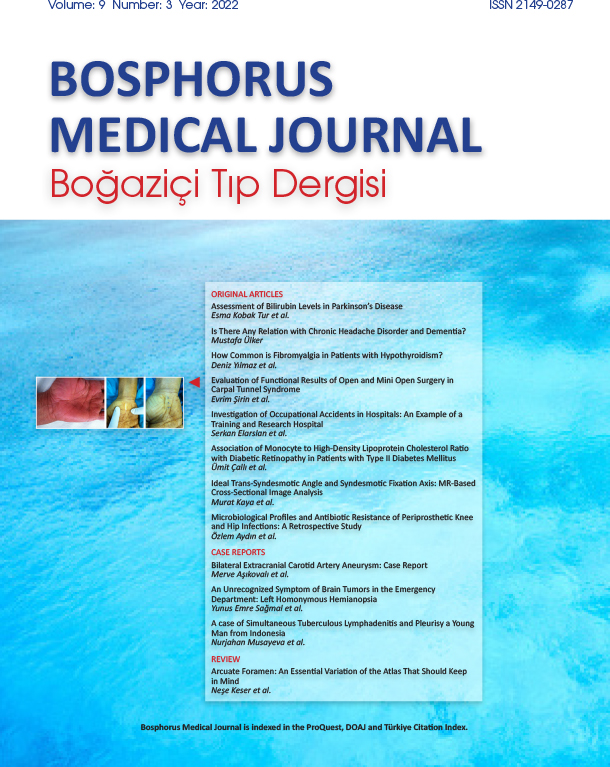Multipl Sklerozda Tedaviye Uyum: İlaç Uygulama Yöntemlerinin ve Nöropsikiyatrik Eşlik Eden Durumların Etkisi
Sena Destan BunulKocaeli Üniversitesi, Nöroloji Anabilim Dalı, Kocaeli, TürkiyeGİRİŞ ve AMAÇ: Multipl skleroz (MS), genç yetişkinleri etkileyen kronik bir nörodejeneratif hastalıktır. Hastalığı modifiye eden ilaçlar (DMD'ler) hastalığın ilerlemesini yönetmeye ve yavaşlatmaya yardımcı olmasına rağmen, bu tedavilere uyum büyük bir sorundur. Bu çalışmada, nöropsikiyatrik değerlendirmeler bağlamında MS hastalarında tedaviye uyum ve farklı ilaç uygulama yöntemleri arasındaki ilişkinin araştırılması amaçlandı.
YÖNTEM ve GEREÇLER: Bir üniversite hastanesi nöroloji kliniğinde, MS tanısı için 2017 yılında gözden geçirilmiş McDonald kriterleri kullanılarak prospektif bir kohort çalışması gerçekleştirildi. Demografik veriler, MS ile ilgili ölçütler ve DMD'ler kaydedildi. Katılımcılar DMD'lerine göre oral, enjektabl ve infüzyon tedavileri olmak üzere kategorilere ayrıldı. MS Tedavi Uyumu Anketi, Beck Depresyon Envanteri ve Sürekli-Kişilik Kaygı Envanteri uygulandı.
BULGULAR: Seksen dokuz hastanın %45'inde tedaviye uyum vardı. Oral ve enjektabl DMD'ler için uyumsuz ve uyumlu gruplar arasında yan etki puanlarında anlamlı farklar vardı. Beck Depresyon Envanteri ortalaması 12,49±9,81 iken, STAI1 ve STAI2 için Sürekli-Kişilik Kaygı Envanteri ortalamaları sırasıyla 38,95±10,41 ve 47,89±10,66 idi. Hastalık süresi, ortalama EDSS puanı ve ortalama STAI puanları arasında anlamlı farklar gözlendi.
TARTIŞMA ve SONUÇ: Uyum oranları ilaç uygulama yöntemine göre değişiklik gösterdi; oral tedavilerde %34,4 uyum, enjektabl tedavilerde %53,4 uyum bulundu. Algılanan etkinlik, depresyon ve anksiyete gibi faktörler tedaviye uyumu etkiledi. Yaş, cinsiyet veya eğitim gibi demografik faktörlerle uyum oranları arasında anlamlı bir korelasyon bulunamadı. Tedaviye uyum, MS'nin yönetilmesinde kritik önem taşımaktadır. Bu çalışma, ilaç uygulama yöntemlerinin ve nöropsikiyatrik komorbiditelerin MS tedavisine uyum üzerindeki rolünü vurgulamaktadır. Bu faktörleri göz önünde bulunduran kapsamlı bir değerlendirme, MS hastaları için uygun bir DMD seçiminde hayati öneme sahiptir.
Treatment Adherence in Multiple Sclerosis: The Effect of Drug Administration Methods and Neuropsychiatric Comorbidities
Sena Destan BunulDepartment of Neurology, Kocaeli University, Kocaeli, TürkiyeINTRODUCTION: Multiple sclerosis (MS) is a chronic neurodegenerative disease affecting young adults. While disease-modifying drugs (DMDs) help manage and decelerate disease progression, adherence to these treatments is a significant challenge. This study aimed to investigate the relationship between treatment adherence and different drug administration methods in MS patients in the context of neuropsychiatric evaluations.
METHODS: A prospective cohort study was conducted at the University Hospital of Neurology Clinic using the 2017 revised McDonald criteria for MS diagnosis. Demographic data, MS-related metrics, and DMDs were recorded. Participants were stratified based on their DMDs into oral, injectable, and infusion treatments. The MS Treatment Adherence Questionnaire, Beck Depression Inventory, and State-Trait Anxiety Inventory were administered.
RESULTS: Of the 89 patients, treatment adherence was 45%. There were significant differences in side effect scores between the non-adherent and adherent groups for both oral and injectable DMDs. The Beck Depression Inventory average score was 12.49±9.81, while the State-Trait Anxiety Inventory average scores for STAI1 and STAI2 were 38.95±10.41 and 47.89±10.66, respectively. Significant differences were observed in disease duration, the average expanded disability status scale score, and the average STAI score.
DISCUSSION AND CONCLUSION: Adherence rates varied with the method of drug administration, with oral treatments having 34.4% adherence and injectable treatments having 53.4%. Factors like perceived efficacy, depression, and anxiety influenced treatment adherence. No significant correlations were found between demographic factors like age, gender, or education and adherence rates. Treatment adherence is crucial in managing MS. This study highlights the role of drug administration methods and neuropsychiatric comorbidities in influencing adherence. A comprehensive assessment considering these factors is vital in choosing an appropriate DMD for MS patients.
Makale Dili: İngilizce




















